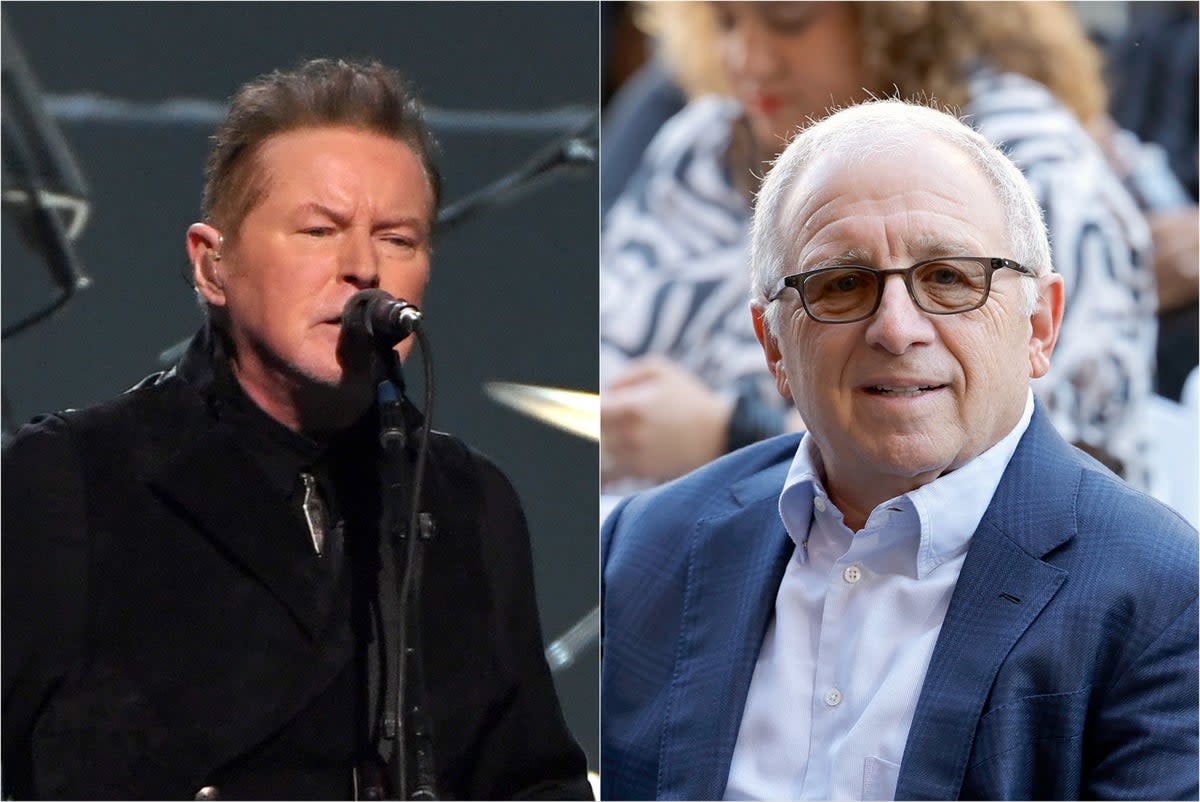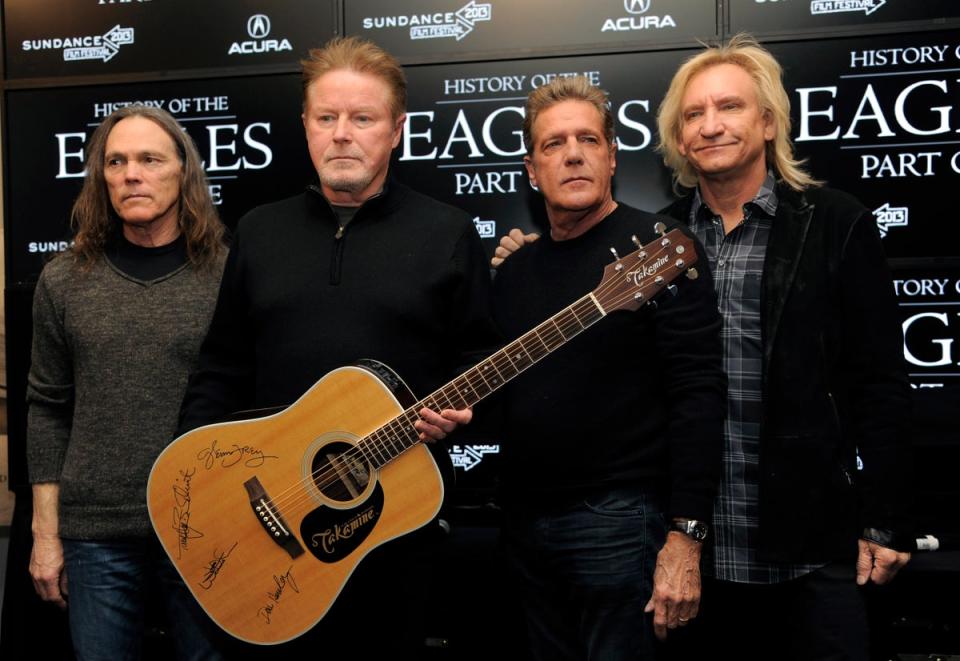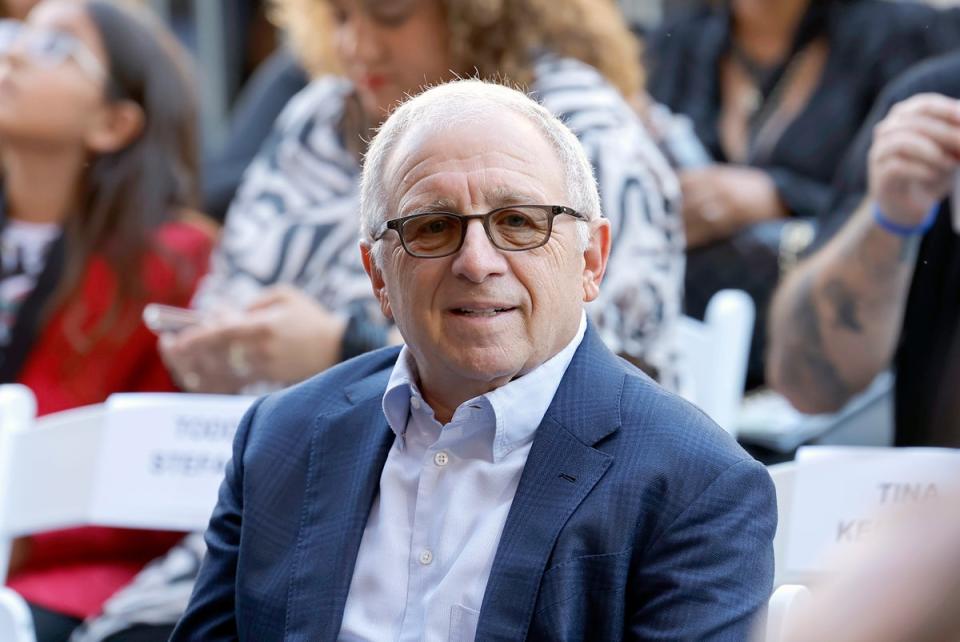Hotel California trial: Unpublished Eagles biography spilled details about painful breakup, manager says

The Eagles’ longtime manager Irving Azoff was the first witness in an extraordinary trial over handwritten lyrics for rock classic Hotel California, that began this week.
Three men – rare book dealer Glenn Horowitz, former Rock & Roll Hall of Fame curator Craig Inciardi, and memorabilia seller Edward Kosinski – are charged with conspiring to own and sell manuscripts of “Hotel California”, along with other Eagles hits, without the band’s consent.
On Wednesday (21 February), the three defendants appeared in front of a judge at New York State Supreme Court, where it was alleged that they “possessed and repeatedly tried to sell handwritten lyric manuscripts from songs from the 1976 album Hotel California, manuscripts that had been authored by and stolen from founding Eagles member Don Henley”.
At the heart of this curious case are draft lyrics from Hotel California, including words to its Grammy-winning title song. Along with notes on some of the band’s best-known solos, the pages feature the immortal lyrics: “You can check out any time you like, but you can never leave.”
All three men have pleaded not guilty – their lawyers say they did not commit any crime with the papers, which they acquired through a writer, Ed Sanders, who was working on an unpublished biography authorised by The Eagles. Sanders, who was given the documents as research for his book in the late Seventies and Eighties, is not charged in the case.
The biography, which delved into The Eagles’ breakup in 1980, has never seen the light of day – much to the band’s relief, Azoff said.
Rolling Stone reports that he appeared in court wearing a dark suit with black trainers, and proceeded to explain that Sanders had been given access to band materials to write an “authentic” biography. However, frontman Don Henley and late Eagles co-founder Glenn Frey, who died in 2016, were “disappointed” with the end result.
“For me, personally, all the stuff about the Eagles’ breakup was unacceptable,” Azoff said.

As the biography project stalled, Sanders grew frustrated and asked Azoff in a 1982 letter for “a substantial amount of money”, claiming he had behaved “with great reserve” by not approaching a major magazine with the inside story of the Eagles’ split in 1980.
This caused a great amount of worry for the band, Azoff said. Frey and Henley were both working on solo careers and did not want “some ugly story of the breakup of the Eagles to be published”.
The band ended up paying Sanders around $75,000 and agreed to let him continue looking for a publisher, content that their 1979 contract would ensure any book would still need their approval. Azoff called the agreement “the lesser of two evils”. Henley maintains that the manuscripts belonged to the Eagles and that the contract between the band and Sanders made that clear.
Through their attorneys, Horowitz, Inciardi and Koskinski claim they were not aware of any contract pertaining to the material until they were arrested in 2022. “All these lyrics are very personal to [Henley], they’re a part of musical history, and it was simply unacceptable to him that they be stolen by anyone else,” Azoff said during testimony.
He said he had never known Henley to part with any of the legal pads on which he, alongside Frey, worked out some of the best-known lyrics in the rock’n’roll songbook.

Horowitz bought five legal pads of lyrics from Sanders for $50,000 in 2005. Inciardi and Kosinski, the latter being the owner of the Gotta Have Rock and Roll auction house, then bought them from Horowitz for $65,000. Court filings state that Henley first noticed the documents up for auction in 2012, buying back some of the material for $8,500 but also reporting the manuscripts as stolen.
Rolling Stone reports that, in their opening statements, attorneys for the defendants expressed indignation that the case was going to trial: “These individuals had absolutely no inkling, no understanding whatsoever, that there was any problem with these items,” Kosinski’s lawyer, Stacey Richman, said.
Azoff’s testimony also provided some insight into the band’s creative methods during the Seventies, the publication said: Henley apparently preferred to write songs on yellow legal pads, while Frey opted for white ones. He compared them to the protagonists of the 1968 comedy film The Odd Couple. “Don [Henley] was the guy that ran around and picked up Glenn [Frey’s] empty beer bottles and cigarette butts. It drove them crazy,” he said. “It’s better they had a neutral place to wreck than one of their houses.”

Attempting to assert Azoff’s reputation as something of a pitbull in the music biz, Kosinski’s lawyer Scott Edelman said: “They referred to you as Satan, right?” He was referring to a memorable comment from Henley, when The Eagles were being inducted into the Rock and Roll Hall of Fame.
“That’s not accurate,” Azoff said. “Mr Henley said, ‘He may be Satan, but he’s our Satan.’’”
He quipped: “Have you heard of humor, sir?”
Azoff is expected to return to the witness stand later today (Thursday 22 February). Henley, the star witness, is expected to take the stand next week.
The trial is expected to last for up to three weeks.
Additional reporting by Associated Press


